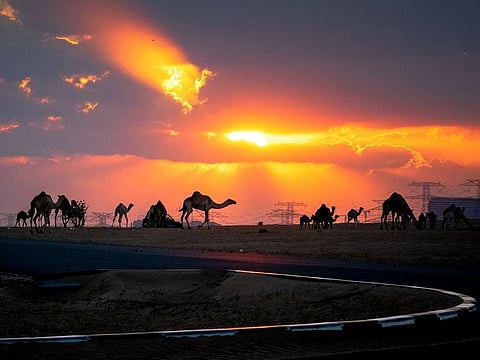Ramadan 2023: Here's where Muslims will fast longest and shortest this year
The daily fast is determined by sunrise and sunset, timings which vary across Earth

Dubai: UAE's Moon-sighting Committee confirmed on Tuesday that the first day of Ramadan will be Thursday, March 23.
The UAE and Saudi Arabia had called on residents to sight the crescent on Tuesday night.
Ramadan lasts for one complete moon cycle, which is usually 29 or 30 days. The moon sighting determines the duration.
First day of fasting
Since predictions have been confirmed by authorities, and Ramadan starts on March 23, fasting Muslim residents in the country will fast from 4.52am (Imsak) to 6.35pm (Maghrib) on the first day, for 13 hours and 43 minutes.
As summer progresses and days get longer, the daily fast duration will also get longer – coming up to 14 hours and 26 minutes towards the end of Ramadan. (This is based on prayer timings in Dubai, other emirates have small differences in sunrise and sunset times.)
These hours depict the average of the number of hours Muslims across the region would fast - from 13 to nearly 15 hours across the month of Ramadan.
Longest fasting hours
Going purely by Fajr and Maghrib timings expected during Ramadan, the fasting residents of Iceland will have the longest durations daily. On the first day of Ramadan, March 23, the fast will last for 15 hours and 33 minutes. On the expected last day of Ramadan, April 21, the duration between Fajr and Maghrib prayers are 16 hours and 20 minutes.
In the MENA region, Algeria will fast the longest on the last day of Ramadan at 14 hours, 58 minutes (as per prayer timings in Algiers).
Shortest fast
Countries in the southern hemisphere of Earth will have shorter fasting hours of around 11-12 hours. For example, the city of King Scott, Chile will have less than 12 hours of fasting, from 6.35am (Fajr) to 6.27pm (Maghrib). Chile being the southermost country in the world will see some of the shortest fasting times in the world.
What if the sun doesn't set?
As we know, there are cities where the sun doesn't 'set', or there is a very short duration between dusk and dawn. For instance, in the northern city of Tromso in Norway the fast could end up being over 17 hours in April.
During certain months of the year, the sun doesn't really set in these northern cities. Given that Ramadan dates change annually, there are certain years when the sunrise-sunset fast is not feasible for residents in these cities.
In such cases, Muslim residents are allowed to follow the fasting times of nearby cities, or of Makkah, Saudi Arabia.
Fasting in space?
UAE's Sultan Al Neyadi will be spending this Ramadan at the International Space Station, and some may wonder how would one go about fasting in space. In orbit, the ISS will see 16 sunrises and sunsets over the course of 24 hours - either happening every 45 minutes approximately.
Muslims who are travelling as exempted from fasting, and they can make up for the days once the travel period has ended or during some other suitable time.
In January, Al Neyadi had addressed the topic of fasting in space and he said, "“I’m in the definition of a traveller, and we can actually break fast and it’s not compulsory."
“And, actually, fasting is not compulsory if you’re not feeling well. Eating sufficient food is allowed if lack of food, nutrition or dehydration can jeopardise the mission, or maybe put a crew member at risk.”
Al Neyadi added that he intended to fast for a couple of days and to share his experience. He also said he will carry some Emirati delicacies and will share them, especially dates, with colleagues on board ISS during Ramadan.

